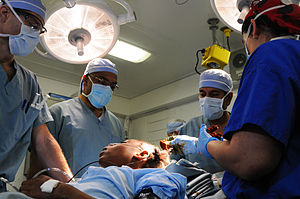Recent news articles have highlighted the dangers facing sportsmen and the impact that decisions made by themselves and their team managers may have on their health and safety.
Spurs keeper Hugo Lloris chose to continue playing after losing consciousness after a head injury during a match. The decision by the football professionals to allow the player to keep playing has since been a hot topic in the headlines.
It has since been argued that the actions of the professionals to allow the player to continue playing were irresponsible and endangered the player’s health.
The question is whether the player’s decision to remain on the pitch after such an incident should have been overruled by his manager/trainers and whether consideration should be given for more involvement of medically trained staff to sign off on such decisions in future and for the decision not to be left to the individual and/or trainers.
Brain injury can be caused by either direct or indirect actions such as a blunt impact or trauma to the head or movement of the brain within the skull. The injury can be severe or minor and appropriate medical equipment such as CT Scans, MRI’S and x-rays may be needed to assess the true extent of the damage caused so without the equipment to hand symptoms must be assessed responsibly and with care.
Guidelines
Following the NHS guidelines loss of consciousness is a symptom of a severe head injury and while the symptom may not mean the individual has suffered a severe brain injury care should be taken when an individual suffers such a symptom.
NHS guidelines state that even if the loss of consciousness is for only a short period of time the individual should attend the accident and emergency department to be assessed thoroughly.
If an individual receives an impact to the head and suffers symptoms such as loss of consciousness trained healthcare professionals will diagnose the injury and its severity in accordance with what is known as The Glasgow Coma Scale. The GCS is a scale which ranges from of 3 – 15 with 3 being the most severe and any score below 8 being classed as a severe head injury which would require treatment in hospital in order for the medical professionals to observe the patient.
Head Injuries
Head injuries can cause bleeding, blood clots and a build up of fluid all of which can put pressure on the brain and if an individual is assessed as having a severe head injury then as part of their recovery the NHS guidelines suggest that that person should be advised not play a contact sport for a period of three weeks and to get plenty of rest which suggests doing such can endanger the person’s health.
This leaves two questions left to consider? Were the professionals who assessed the player qualified to make the assessment based on the above approved medical scale as if not, should the player’s decision have been overruled by the management team to ensure his health was not further endangered? And, who should the decision lie with to seek further medical attention, the managers/ trainers or the individual?
A head injury can cause serious brain injury and all precautions should be made to ensure an injured person’s health and safety is not further endangered but the question truly to be debated is whether an individual’s choice to seek medical treatment after such an incident should be overruled by professionals.
Cormac Reynolds is a writer and a claims specialist he has written for a number of sites in this area. He has worked for a long time on articles like this one and writes regularly for Claims Liverpool.
[toggle title=”Featured images”]
[/toggle]
Related articles
- Brain injuries are nothing to play with (denverpost.com)
- Football and rugby players’ head injuries raise brain damage risk (telegraph.co.uk)
- How dangerous is it play on after being knocked out? (bbc.co.uk)
- Tottenham labelled ‘dangerous and irresponsible’ for leaving Hugo Lloris on pitch after head injury (mirror.co.uk)



Leave a Reply